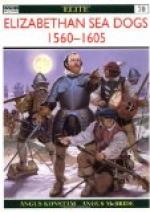As the unflinching Armada stood slowly up the Channel a sail or two would drop out by the way, dead-beat. One night several strange sail passed suddenly by Drake. What should he do? To go about and follow them with all astern of him doing the same in succession was not to be thought of, as his aftermost vessels were merchantmen, wholly untrained to the exact combined manoeuvres required in a fighting fleet, though first-rate individually. There was then no night signal equivalent to the modern ‘Disregard the flagship’s movements.’ So Drake dowsed his stern light, went about, overhauled the strangers, and found they were bewildered German merchantmen. He had just gone about once more to resume his own station when suddenly a Spanish flagship loomed up beside his own flagship the Revenge. Drake immediately had his pinnace lowered away to demand instant surrender. But the Spanish admiral was Don Pedro de Valdes, a very gallant commander and a very proud grandee, who demanded terms; and, though his flagship (which had been in collision with a run-amuck) seemed likely to sink, he was quite ready to go down fighting. Yet the moment he heard that his summoner was Drake he surrendered at discretion, feeling it a personal honor, according to the ideas of the age, to yield his sword to the greatest seaman in the world. With forty officers he saluted Drake, complimenting him on ’valour and felicity so great that Mars and Neptune seemed to attend him, as also on his generosity towards the fallen foe, a quality often experienced by the Spaniards; whereupon,’ adds this eyewitness, ’Sir Francis Drake, requiting his Spanish compliments with honest English courtesies, placed him at his own table and lodged him in his own cabin.’ Drake’s enemies at home accused him of having deserted his fleet to capture a treasure ship—for there was a good deal of gold with Valdes. But the charge was quite unfounded.
A very different charge against Howard had more foundation. The Armada had anchored at Calais to get its breath before running the gauntlet for the last time and joining Parma in the Netherlands. But in the dead of night, when the flood was making and a strong west wind was blowing in the same direction as the swirling tidal stream, nine English fire-ships suddenly burst into flame and made for the Spanish anchorage. There were no boats ready to grapple the fire-ships and tow them clear. There was no time to weigh; for every vessel had two anchors down. Sidonia, enraged that the boats were not out on patrol, gave the order for the whole fleet to cut their cables and make off for their lives. As the great lumbering hulls, which had of course been riding head to wind, swung round in the dark and confusion, several crashing collisions occurred. Next morning the Armada was strung along the Flemish coast in disorderly flight. Seeing the impossibility of bringing the leewardly vessels back against the wind in time to form up, Sidonia ran down with the windward ones and formed farther off. Howard then led in pursuit. But seeing the capitana of the renowned Italian galleasses in distress near Calais, he became a medieval knight again, left his fleet, and took the galleasse. For the moment that one feather in his cap seemed better worth having than a general victory.




